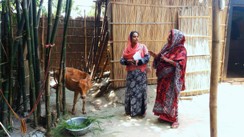What does it feel like to be poor? To be guilty of fate? To be settling with the guilt everyday and living one day at a time?
These are questions that we often come across while going through our textbooks, skimming through newspapers and social media. But the question I never asked and never thought of asking myself was: What does it feel like to see poverty?
I have had my exposure visits to poverty, or I thought I did during my undergrad years for researches I carried out at times for academic or my personal passion. I have interviewed slum households in Dhaka, saw televisions with cable connections and refrigerators; I have spoken to the poor urban women entrepreneurs of Dhaka city, more bold, focused and ferocious than many educated women who thought themselves to be independent; I have interviewed the beggars of the city and came across incidences where assets included acres of land, farms, multiple houses etc.
In my visit to Ullapara, I came across families under the BRAC Targeting Ultra Poor (TUP) Programme, a revolutionary approach that showed that people can ‘graduate’ out of extreme poverty with a 95% success rate. I thought I had my share of experience with poverty while learning about the TUP programme in my first few weeks at BRAC. But the visit came as a shock when I went to the house of Zayda, a participant of the programme.
The house was recently upgraded by BRAC to help Zayda take care of the calf she had received from the programme. The PO(Programme Organiser) was testing the app called ‘Impact Atlas’ that BRAC is trying to introduce to the programme currently on a pilot basis, developed in partnership with Amplifier Strategies USA. She was asking Zayda questions on the previous lessons she had discussed on disaster preparedness, nutrition and hygiene. She outlined few dots in her notebook and asked Zayda to practice writing her name.
I spoke to Zayda, starting with a joke to make her comfortable, “She talks a lot right? How do you remember so much?” “She is very nice, she really tried to teach me, I didn’t learn everything at once, never knew a single letter and now I can write my name without the dots!” she replied, still a bit hesitant. “The manual says you should drink milk, I saw hundreds of cows on our way here, milk must be available widely here right?” I asked. “No, it is available but sold at a price equivalent to Dhaka, we cannot afford it regularly. The cows belong to the factories not to us. I am waiting for my calf to become a cow” she replied.
I moved ahead with the conversation, no questions on the project, but how she sees herself, her views, what she deems most important in life, how does the struggle feel and what keeps her going etc. She showed me her house. I asked her what she liked doing most in a day, “Talking to other neighbour women I think” she replied.
The lens with which I observed poverty before, I could feel it shatter in front of my own eyes, for there is one thing I didn’t experience before; extreme vulnerability and helplessness, that I could see being reflected in her eyes, the limits of her dreams and the hesitation with which she spoke of them. The small hut that Zayda and her husband lives in, only possessed a bed, some clothes on a stand and 3 pots used as kitchen utensils. I was bearing witness to a moment lost somewhere between gratefulness and guilt.
I was honest to her about my little attempt to understand how she felt. I asked her “Do you ever feel guilty (for being poor)? “I feel cursed” she replied.
What we often miss out on, is the fact that poverty is, in all terms, a feeling, for both the one who is observing and the one who is experiencing. It’s less of a parameter of numbers that define someone’s survival instincts and more of a feeling of vulnerability and helplessness and being cursed. Something we can only try and pretend to understand.
